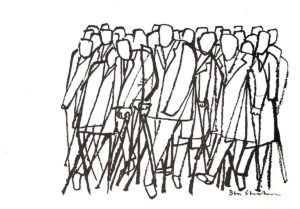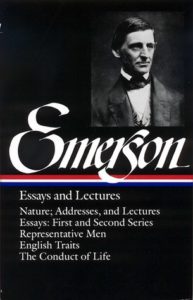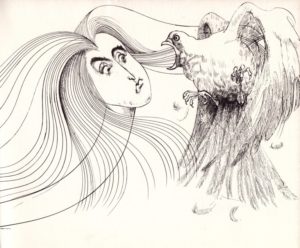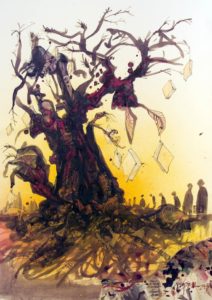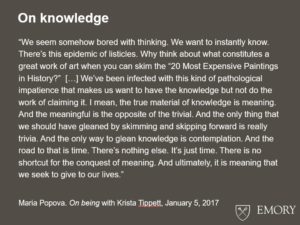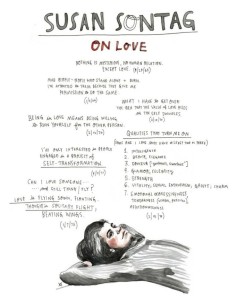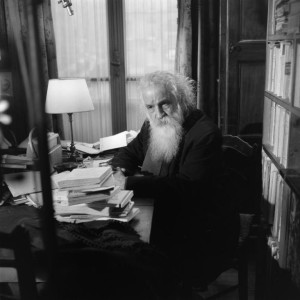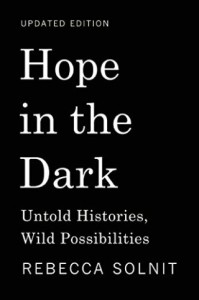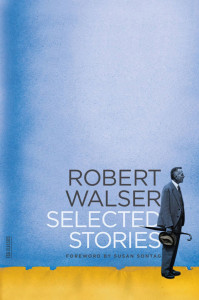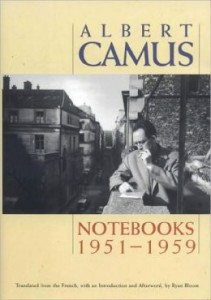Maria Papova
Emerson & the tyranny of the masses.
May 11, 2017“Masses are rude, lame, unmade, pernicious in their demands and influence; I wish not to concede anything to them, but to tame, drill, divide, and break them up, and draw individuals out of them”
Maria Popova/brainpickings
When you adopt the standards and the values of someone else,” Eleanor Roosevelt wrote in her timeless meditation on happiness and conformity, “you surrender your own integrity [and] become, to the extent of your surrender, less of a human being.” And yet we exist within a society, as individual particles that coagulate into the so-called masses, awash in societal standards that often permeate our consciousness without our conscious consent or even awareness. How, then, do we mediate between the inescapable social dimension of our lives and the unassailable integrity of individual personhood?
Wedged in time between Søren Kierkegaard’s keen insight into the psychology of conformity and Nobel laureate Elias Canetti’s incisive treatise on crowds and powerwas another intellectual titan of the human spirit, Ralph Waldo Emerson (May 25, 1803–April 27, 1882), who addressed this question in an essay titled “Considerations by the Way,” found in his indispensable Essays and Lectures (public library | free download).
With spirited disdain for conformity, Emerson writes:
Leave this hypocritical prating about the masses. Masses are rude, lame, unmade, pernicious in their demands and influence, and need not to be flattered but to be schooled. I wish not to concede anything to them, but to tame, drill, divide, and break them up, and draw individuals out of them… Masses! the calamity is the masses. I do not wish any mass at all, but honest men only, lovely, sweet, accomplished women only, and no shovel-handed, narrow-brained, gin-drinking million stockingers or lazzaroni at all. If government knew how, I should like to see it check, not multiply the population. When it reaches its true law of action, every man that is born will be hailed as essential. Away with this hurrah of masses, and let us have the considerate vote of single men spoken on their honor and their conscience.
[…]
The majority are unripe, and have not yet come to themselves, do not yet know their opinion. That, if they knew it, is an oracle for them and for all.
But Emerson is careful to recognize that such ripeness of conscience and character, which aligns with Einstein’s notion of “spiritual genius,” isn’t evenly distributed among the population — the most honorable and conscious individuals, he argues, are rare to come by, yet they are the ones responsible for humanity’s greatest and most lasting feats of creativity and intellect. More than a century before Jacob Bronowski asserted that “the creative personality is always one that looks on the world as fit for change and on himself as an instrument for change,” Emerson writes:
Nature makes fifty poor melons for one that is good, and shakes down a tree full of gnarled, wormy, unripe crabs, before you can find a dozen dessert apples… Nature works very hard, and only hits the white [of the bull’s eye] once in a million throws. In mankind, she is contented if she yields one master in a century. The more difficulty there is in creating good men, the more they are used when they come… All revelations, whether of mechanical or intellectual or moral science, are made not to communities, but to single persons. All the marked events of our day, all the cities, all the colonizations, may be traced back to their origin in a private brain. All the feats which make our civility were the thoughts of a few good heads.
The hope, of course, is that in the century and a half since Emerson’s day — a time when such “good heads” belonged only to white men — we have created and must continue to create more and more opportunities for greatness across all sections of the population, so that the revolutionary “revelations” Emerson extols may come from a kaleidoscope of perspectives, building toward a more beautiful and just humanity. But such a mission would only succeed on the wings of the same necessary rejection of mob mentality, the same dismantling of the mindless masses into thinking individuals, that Emerson himself so spiritedly espoused.
On Dialogue
February 24, 2017[Ralph Steadman art]
In spite of this worldwide system of linkages, there is, at this very moment, a general feeling that communication is breaking down everywhere, on an unparalleled scale…what appears [in the media] is generally at best a collection of trivial and almost unrelated fragments, while at worst, it can often be a really harmful source of confusion and misinformation.
He terms this “the problem of communication” and writes:
Different groups … are not actually able to listen to each other. As a result, the very attempt to improve communication leads frequently to yet more confusion, and the consequent sense of frustration inclines people ever further toward aggression a and violence, rather than toward mutual understanding and trust.
More from Maria Papova/brainpickings and David Bohm:
“It is clear that if we are to live in harmony with ourselves and with nature, we need to be able to communicate freely in a creative movement in which no one permanently holds to or otherwise defends his own ideas.
Language is collective. Most of our basic assumptions come from our society, including all our assumptions about how society works, about what sort of person we are supposed to be, and about relationships, institutions, and so on. Therefore we need to pay attention to thought both individually and collectively.
“Dialogue” comes from the Greek word dialogos. Logos means “the word,” or in our case we would think of the “meaning of the word.” And dia means “through” — it doesn’t mean “two.” A dialogue can be among any number of people, not just two. Even one person can have a sense of dialogue within himself, if the spirit of the dialogue is present. The picture or image that this derivation suggests is of a stream of meaning flowing among and through us and between us. This will make possible a flow of meaning in the whole group, out of which may emerge some new understanding. It’s something new, which may not have been in the starting point at all. It’s something creative. And this shared meaning is the “glue” or “cement” that holds people and societies together.
Contrast this with the word “discussion,” which has the same root as “percussion” and “concussion.” It really means to break things up. It emphasizes the idea of analysis, where there may be many points of view, and where everybody is presenting a different one — analyzing and breaking up. That obviously has its value, but it is limited, and it will not get us very far beyond our various points of view. Discussion is almost like a ping-pong game, where people are batting the ideas back and forth and the object of the game is to win or to get points for yourself…
In a dialogue, however, nobody is trying to win. Everybody wins if anybody wins. There is a different sort of spirit to it. In a dialogue, there is no attempt to gain points, or to make your particular view prevail. Rather, whenever any mistake is discovered on the part of anybody, everybody gains. It’s a situation called win-win, whereas the other game is win-lose — if I win, you lose. But a dialogue is something more of a common participation, in which we are not playing a game against each other, but with each other. In a dialogue, everybody wins.”
‘We know truth when we see it.’
[Illustration by Ralph Steadman for Ray Bradbury’s ‘Fahrenheit 451.’]
“Character is higher than intellect. Thinking is the function. Living is the functionary… A great soul will be strong to live, as well as strong to think.”
Ralph Waldo Emerson
[A] great influence into the spirit of the scholar, is, the mind of the Past, — in whatever form, whether of literature, of art, of institutions, that mind is inscribed. Books are the best type of the influence of the past… The theory of books is noble. The scholar of the first age received into him the world around; brooded thereon; gave it the new arrangement of his own mind, and uttered it again… It was dead fact; now, it is quick thought. It can stand, and it can go. It now endures, it now flies, it now inspires. Precisely in proportion to the depth of mind from which it issued, so high does it soar, so long does it sing.
I do not see how any man can afford, for the sake of his nerves and his nap, to spare any action in which he can partake. It is pearls and rubies to his discourse. Drudgery, calamity, exasperation, want, are instructers in eloquence and wisdom. The true scholar grudges every opportunity of action past by, as a loss of power. It is the raw material out of which the intellect moulds her splendid products.
Character is higher than intellect. Thinking is the function. Living is the functionary. The stream retreats to its source. A great soul will be strong to live, as well as strong to think…’
-Emerson
More framer Cultural Ambassador Maria Papova/brainpickings:
On love.
November 1, 2016‘…sudden inflection of human genius.’
September 19, 2016French philosopher Gaston Bachelard:
Whether it comes from suffering, or whether it comes from joy, we all experience as human beings this moment of illumination at some point in our lives: a moment when we suddenly understand our own message, a moment when knowledge, by shedding light on passion, detects at once the rules and relentlessness of destiny — a truly synthetic moment when decisive failure, by rendering us conscious of the irrational, becomes the success of thought. That is the locus of the differential of knowledge, the Newtonian burst that allows us to appreciate how insight springs forth from ignorance — the sudden inflection of human genius upon the curvature of life’s progress. Intellectual courage consists in actively and vitally preserving this instant of nascent knowledge, of making it the unceasing fountain of our intuition, and of designing, with the subjective history of our errors and faults, the model of a better, more illuminated life.
<Maria Papova>
Hope.
July 3, 2016Victor Frankl:
‘Without hope there is no meaning. Without meaning there is no hope.’
~
Elie Wiesel:
‘For me, hope without memory is like memory without hope.’
~
Maria Papova:
Critical thinking without hope is cynicism. Cynicism without critical thinking is naïveté.
~
Rebecca Solnit
The moment passed long ago, but despair, defeatism, cynicism, and the amnesia and assumptions from which they often arise have not dispersed, even as the most wildly, unimaginably magnificent things came to pass. There is a lot of evidence for the defense… Progressive, populist, and grassroots constituencies have had many victories. Popular power has continued to be a profound force for change. And the changes we’ve undergone, both wonderful and terrible, are astonishing.
[…]
This is an extraordinary time full of vital, transformative movements that could not be foreseen. It’s also a nightmarish time. Full engagement requires the ability to perceive both.
[…]
There’s a public equivalent to private depression, a sense that the nation or the society rather than the individual is stuck. Things don’t always change for the better, but they change, and we can play a role in that change if we act. Which is where hope comes in, and memory, the collective memory we call history.
[…]
You row forward looking back, and telling this history is part of helping people navigate toward the future. We need a litany, a rosary, a sutra, a mantra, a war chant for our victories. The past is set in daylight, and it can become a torch we can carry into the night that is the future.
Maria Papova…
August 16, 2015…always finding the light.
Parker Palmer’s Spectacular Commencement Address on the Six Pillars of the Wholehearted Life
“Take everything that’s bright and beautiful in you and introduce it to the shadow side of yourself… When you are able to say, ‘I am … my shadow as well as my light,’ the shadow’s power is put in service of the good.”
‘In 1974, the Tibetan Buddhist teacher and Oxford alumnus Chögyam Trungpa founded Naropa University in Boulder, Colorado — a most unusual and emboldening not-for-profit educational institution named after the eleventh-century Indian Buddhist sage Naropa and intended as a 100-year experiment of combining the best methodologies of Western scholarship with the most timeless tenets of Eastern wisdom, fusing academic and experiential learning with contemplative practice. Under the auspices of its Jack Kerouac School of Disembodied Poetics, founded by Allen Ginsberg, the university hosted a number of lectures and readings by such luminaries as John Cage, William S. Burroughs, and Jack Kerouac himself, for all of whom Buddhism was a major influence.
In 2015, Naropa University awarded its first-ever honorary degree of Doctor of Contemplative Education to author, educator, and Center for Courage & Renewalfounder Parker Palmer — one of the most luminous and hope-giving minds of our time, whose beautiful writings on inner wholeness and the art of letting your soul speak spring from a spirit of embodied poetics. In May of 2015, he took the podium before the university’s graduating class and delivered one of the greatest commencement addresses of all time — a beam of shimmering wisdom illuminating the six pillars of a meaningful human existence, experience-tested and honestly earned in the course of a long life fully lived.
Annotated highlights below — please enjoy.’
‘If Librarians Were Honest’
August 10, 2015From Maria Papova.
The Art of Walking…
July 15, 2015
(From Maria Papova)
‘The Walk — a most unusual and rewarding 1917 piece by Swiss modernist writer Robert Walser. It was eventually translated into English by Christopher Middleton in 1955 — the only work of Walser’s published in English during his lifetime — and included in his altogether fantastic Selected Stories (public library).’
‘The novella’s beginning calls to mind Thoreau’s assertion that “every walk is a sort of crusade” as Walser paints the perfect backdrop for the perfect walk:’
I have to report that one fine morning, I do not know any more for sure what time it was, as the desire to take a walk came over me, I put my hat on my head, left my writing room, or room of phantoms, and ran down the stairs to hurry out into the street. I might add that on the stairs I encountered a woman who looked like a Spaniard, a Peruvian, or a Creole. She presented to the eye a certain pallid, faded majesty. But I must strictly forbid myself a delay of even two seconds with this Brazilian lady, or whatever she might be; for I may waste neither space nor time. As far as I can remember as I write this down, I found myself, as I walked into the open, bright, and cheerful street, in a romantically adventurous state of mind, which pleased me profoundly. The morning world spread out before my eyes appeared as beautiful to me as if I saw it for the first time. Everything I saw made upon me a delightful impression of friendliness, of goodliness, and of youth. I quickly forgot that up in my room I had only just a moment before been brooding gloomily over a blank sheet of paper. All sorrow, all pain, and all grave thoughts were as vanished, although I vividly sensed a certain seriousness, a tone, still before me and behind me. I was tense with eager expectation of whatever might encounter me or cross my way on my walk. My steps were measured and calm, and, as far as I know, I presented, as I went on my way, a fairly dignified appearance. My feelings I like to conceal from the eyes of my fellow men, of course without any fearful strain to do so — such strain I would consider a great error, and a mighty stupidity.
Maria Papova Covers Camus
June 16, 2015Those who prefer their principles over their happiness, they refuse to be happy outside the conditions they seem to have attached to their happiness.”
 “For the first time in history,” Bertrand Russell asserted in reflecting on the impact of the Industrial Revolution, “it is now possible … to create a world where everybody shall have a reasonable chance of happiness.” Indeed, we’ve pounced on that chance with overzealous want: Ours is a culture so consumed with the relentless pursuit of happiness, its secrets and its science, that it layers over the already uncomfortable state of unhappiness a stigma of humiliation and shame. But unhappiness can have its own dignity and can tell us as much, if not more, about who we are than happiness. That’s precisely what French philosopher and Nobel laureate Albert Camus considers in a portion of his private writings, collected in Notebooks 1951–1959 (public library).
“For the first time in history,” Bertrand Russell asserted in reflecting on the impact of the Industrial Revolution, “it is now possible … to create a world where everybody shall have a reasonable chance of happiness.” Indeed, we’ve pounced on that chance with overzealous want: Ours is a culture so consumed with the relentless pursuit of happiness, its secrets and its science, that it layers over the already uncomfortable state of unhappiness a stigma of humiliation and shame. But unhappiness can have its own dignity and can tell us as much, if not more, about who we are than happiness. That’s precisely what French philosopher and Nobel laureate Albert Camus considers in a portion of his private writings, collected in Notebooks 1951–1959 (public library).
In a meditation on Oscar Wilde’s relationship with art, Camus considers the notion of sorrow, the exorcism of which is one of art’s 7 therapeutic functions, and adds to history’s finest definitions of art:
[Oscar Wilde] wanted to place art above all else. But the grandeur of art is not to rise above all. On the contrary, it must blend with all. Wilde finally understood this, thanks to sorrow. But it is the culpability of this era that it always needed sorrow and constraint in order to catch a glimpse of a truth also found in happiness, when the heart is worthy. Servile century.
In a 1956 letter to a hospitalized friend, Camus explores how body and mind conspire in sorrow and happiness:
The solidarity of bodies, unity at the center of the mortal and suffering flesh. This is what we are and nothing else. We are this plus human genius in all its forms, from the child to Einstein.
No, … it is not humiliating to be unhappy. Physical suffering is sometimes humiliating, but the suffering of being cannot be, it is life. … What you must do now is nothing more than live like everybody else. You deserve, by what you are, a happiness, a fullness that few people know. Yet today this fullness is not dead, it is a part of life and, to its credit, it reigns over you whether you want it to or not. But in the coming days you must live alone, with this hole, this painful memory. This lifelessness that we all carry inside of us — by us, I mean to say those who are not taken to the height of happiness, and who painfully remember another kind of happiness that goes beyond the memory.
Sometimes, for violent minds, the time that we tear off for work, that is torn away from time, is the best. An unfortunate passion.
Camus later revisits this osmosis between the physical and the metaphysical in a poignant reflection on our self-imposed prisons of unhappiness:
It is not true that the heart wears out — but the body creates this illusion.
Those who prefer their principles over their happiness, they refuse to be happy outside the conditions they seem to have attached to their happiness. If they are happy by surprise, they find themselves disabled, unhappy to be deprived of their unhappiness.
“All true happiness, as all that is truly beautiful, can only result from order,”Benjamin Franklin wrote, and yet, as Camus so stirringly reminds us, order itself, when worshiped too blindly and rigidly, can consume our fragile chance of happiness.
Complement Notebooks 1951–1959 with the story of Camus’s unlikely and extraordinary friendship with pioneering biologist Jacques Monod.
‘Do what you love.’
June 2, 2015“Perhaps what is truly known can not be described or articulated by creativity or logic, science or art.”
From Maria Papova:
In her altogether fantastic commencement address on courage and the creative life – one of the greatest commencement addresses of all time – artist, designer, and Design Matters host Debbie Millman offers:
“The grand scheme of a life — maybe, just maybe — is not about knowing or not knowing, choosing or not choosing. Perhaps what is truly known can’t be described or articulated by creativity or logic, science or art. Perhaps it can be expressed by the most authentic and meaningful combination of the two: poetry.
As Robert Frost once wrote, “A poem begins as a lump in the throat, a sense of wrong, a homesickness, a lovesickness. It is never a thought to begin with.”
I recommend the following course of action for those, like you, who are just starting out, or who, like me, may be re-configuring midway through. Heed the words of Robert Frost. Start with a big fat lump in your throat. Start with a profound sense of wrong, a deep homesickness, a crazy lovesickness, and run with it. If you imagine less, less will be what you undoubtedly deserve. Do what you love. And don’t stop until you get what you love. Work as hard as you can. Imagine immensities. Don’t compromise and don’t waste time. In order to strive for a remarkable life, you have to decide that you want one. Start now. Not twenty years from now. Not thirty years from now. Not two weeks from now. Now.”
